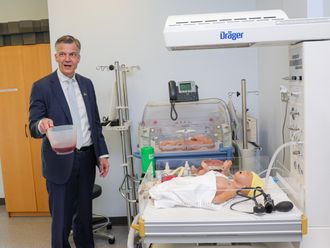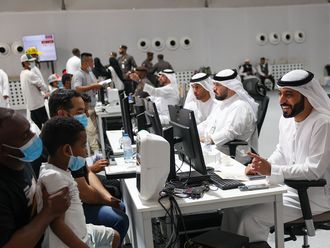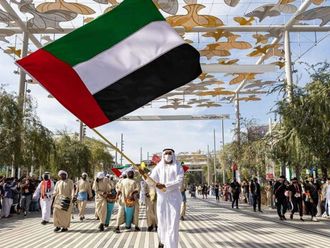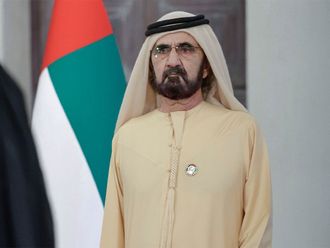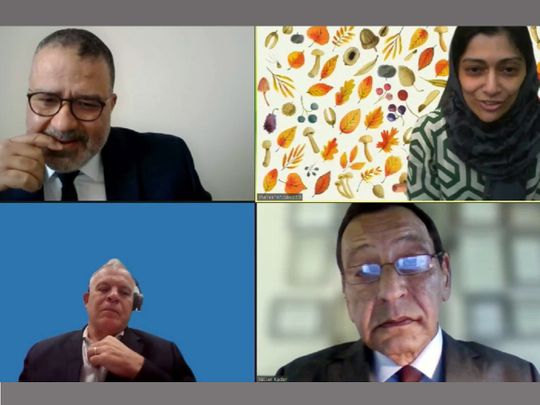
Dubai: Cancer patients in the UAE have access to advanced precision medicines and cutting-edge diagnosis incorporating Artificial Intelligence (AI), a top doctor said today.
To ensure accurate cancer diagnosis and personalised therapy, the UAE offers three types of tests, said Dr Shaheenah Dawood, consultant medical oncologist and adjunct clinical professor at Mohammed Bin Rashid University of Medicine and Health Sciences.
Tissue profiling allows experts to determine the targets for effective treatment, while liquid biopsy analyses cancer cells in a patient’s blood sample. Additionally, minimal residual disease detection enables the identification of potential cancer cells through blood tests even after successful treatment, explained Dr Dawood, who is also the president of the UAE Cancer Congress.
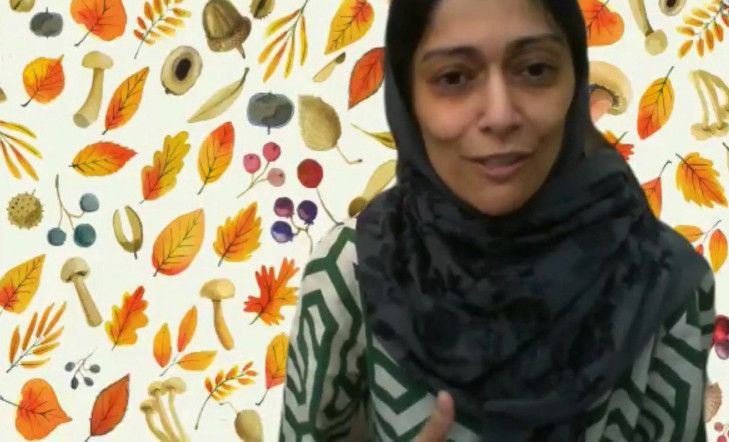
She was answering questions from Gulf News during a media roundtable held as part of the first Middle East, Russia, and Africa (MERA) Precision Medicine Summit organised by global pharmaceutical firm Pfizer.
read more
- Watch: Cancer survivors in UAE reveal journey of ordeal and hope
- Breast cancer screenings should start at 40, not 50
- UAE: Chemo robot, artificial intelligence-guided radiotherapy for cancer care now available in Abu Dhabi
- How prostate cancer can be treated without radical surgery
- Cancer literacy is key to managing the disease in the region, say experts
Focus on precision medicine
The event brought together more than 90 regional and international expert oncologists and pathologists to discuss the advances in precision medicine for cancer treatments. The experts explored innovations in treatments for advanced non-small cell lung cancer, breast cancer, colorectal cancer, and melanoma.
Precision medicine refers to tailored medical treatment to individual characteristics of each patient and their cancer. It involves analysing a patient’s genetic makeup, tumour characteristics, and other relevant factors to identify targeted therapies that are likely to be more effective and have fewer side effects. By personalising treatment plans based on specific molecular profiles, precision medicine aims to improve outcomes and enhance the overall quality of care for cancer patients.
The summit covered its impact on patients, including cancer genomics, biomarkers, molecular diagnostics, targeted drug therapies and its future perspectives.
While some tests to offer precision medicines in the UAE are performed within the country, Dr Dawood said, others are sent abroad to approved agencies for comprehensive analysis.
She said the UAE is second only to the USA in obtaining regulatory clearance for ensuring that patients have timely access to vital medications necessary for their treatment, bolstering their chances of a successful recovery.
“The UAE takes a holistic approach to healthcare, providing support to individuals of all nationalities and ethnicities,” the oncologist added.
The country’s commitment to determining cancer causes is paramount, considering the unique demographic characteristics of its population. “With a majority being expatriates and a dynamic population due to frequent immigration, the challenge lies in identifying the underlying causes of cancer in this diverse group.”
However, she said the UAE remains steadfast in its efforts to support everyone, irrespective of their background.
Early detection
Early detection and screening programmes are in place to identify cancer at its earliest stages.
“The government has implemented a comprehensive Primary Health Care programme throughout the UAE, offering accessible screening facilities. However, empowering individuals to seek comprehensive care from general practitioners (GPs) remains crucial to reduce the incidence of advanced malignancies. Regular check-ups with GPs provide a holistic approach to healthcare, addressing not only cancer screening but also overall well-being,” Dr Dawood emphasised.
Embracing the future of healthcare, the UAE has also integrated AI into oncology practices. AI supports molecular profiling, diagnostics, and radiology, augmenting the expertise of medical professionals.
“AI software aids in identifying unknown primaries, facilitating prompt and accurate diagnoses. Moreover, AI enhances the accuracy of detecting abnormalities in mammograms, ultrasounds, and MRIs, ultimately improving patient outcomes.”
However, Dr Dawood stressed that human involvement remains paramount in providing comprehensive care.
Staggering statistics
In 2020, the World Health Organisation reported a staggering number of cancer cases and deaths worldwide, the summit heard.
More than 19 million new cases of cancer were detected in 2022, and the global death toll from all types of cancer reached around 10 million. Among these, lung cancer accounted for the highest fatality rate, claiming around 1.8 million lives. Colorectal cancer followed closely with 900,000 deaths, while liver cancer caused 830,000 deaths.
Regionally, there is a growing concern regarding the rising incidence of cancer. Projections indicate a startling 1.8-fold increase in cancer cases in the Arab world, underscoring the urgent need for timely action.
The summit covered how precision medicine can address this growing concern, its impact on patients, including cancer genomics, biomarkers, molecular diagnostics, targeted drug therapies and its future perspectives.
Enhancing patient care
Hatem El Kadi, regional oncology medical lead, Pfizer (MERA), said: “Precision medicine has revolutionised cancer care, allowing for tailored treatments based on individual genetic profiles and tumor characteristics. By personalising treatment approaches, we have the potential to significantly enhance patient care and transform the entire landscape of cancer treatment.”
Yasser Abdel Kader, professor of Oncology and director of the Oncology Department Research Unit, Cairo University, Egypt, and Simon Nayler, partner and consultant pathologist, Drs Gritzman and Thatcher Inc. Laboratories, South Africa, also shared valuable inputs about the importance of precision medicine.
During the discussion, Pfizer also launched its cancer awareness campaign ‘Take Action’ that urges healthcare providers, patients, and the general public in the region to proactively take charge of their health by recognising the importance of early cancer detection and embracing necessary measures.





